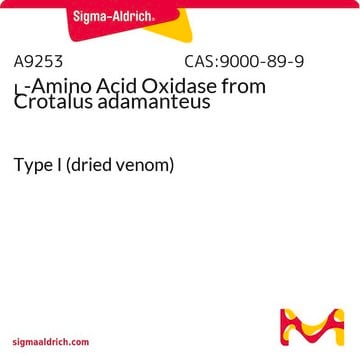F7296
Fructosyl-Amino Acid Oxidase from Corynebacterium sp.
recombinant, expressed in E. coli, lyophilized powder, ≥0.45 units/mg protein
Iniciar sesiónpara Ver la Fijación de precios por contrato y de la organización
About This Item
Comisión internacional de enzimas:
1.5.3.x
EC Number:
MDL number:
UNSPSC Code:
12352204
NACRES:
NA.54
Productos recomendados
recombinant
expressed in E. coli
form
lyophilized powder
specific activity
≥0.45 units/mg protein
mol wt
~88 kDa by electrophoresis
storage temp.
−20°C
General description
Fructosyl amino acid oxidase [fructosyl-a-l-amino acid:oxygen oxidoreductase] is a flavoprotein that catalyzes the oxidation of fructosyl amino acids to form glucosone, amino acid and hydrogen peroxide.
Enzyme Commission (E.C.) 1.5.3.x
Application
Fructosyl-Amino Acid Oxidase from Corynebacterium sp has been used in glycated haemoglobin HbA1c detection in blood samples using quartz crystal microbalance (QCM) based detection.
Fructosyl-amino acid oxidase can be used to detect the levels of glycated proteins, which are markers for diabetes mellitus.
Biochem/physiol Actions
Fructosamines are formed when glucose is condensed amino group of amino acids or proteins. Fructosamine oxidases (FAOX) catalyze the oxidative deglycation of low molecular weight fructosamines. Fructosyl amino acid oxidase catalyzes the oxidation of the C-N bond linking the C1 of the fructosyl moiety and the nitrogen of the amino group of fructosyl amino acids.
Fructosyl-Amino Acid Oxidase (FAOD) comprises of FAD-binding motifs and is classified into three types based on substrate specificity. The engineered Corynebacterium Fructosyl-Amino Acid Oxidase is stable at 45°C and could be exploited for the development of glycated protein biosensing system and glycated hemoglobin HbA1c measurements. FAOD shares sequence homology with fructosyl peptide oxidase and both are effective on α-fructosyl substrates.
Suitable for the determination of fructosyl-L-amino acid.
Unit Definition
One unit will produce 1.0 μmole of hydrogen peroxide per minute at pH 8.0 at 37 °C.
Storage Class
11 - Combustible Solids
wgk_germany
WGK 3
flash_point_f
Not applicable
flash_point_c
Not applicable
ppe
Eyeshields, Gloves, type N95 (US)
Certificados de análisis (COA)
Busque Certificados de análisis (COA) introduciendo el número de lote del producto. Los números de lote se encuentran en la etiqueta del producto después de las palabras «Lot» o «Batch»
¿Ya tiene este producto?
Encuentre la documentación para los productos que ha comprado recientemente en la Biblioteca de documentos.
Los clientes también vieron
S A Schellini et al.
Acta ophthalmologica, 67(5), 601-604 (1989-10-01)
The authors report a case of fibrohistiocytoma of the limbus and discuss the clinical, histopathological and immunohistochemical findings concerning this type of lesion, with a comparison of their findings with those reported in the literature.
Y Sakai et al.
FEBS letters, 459(2), 233-237 (1999-10-13)
A high-level production of fructosyl amino acid oxidase (FAOD), whose production was toxic in Escherichia coli, was investigated through attempts to utilize the peroxisome of Candida boidinii as the place for protein accumulation. The alcohol oxidase-depleted strain (strain aod1Delta) produced
Stefano Ferri et al.
Journal of diabetes science and technology, 3(3), 585-592 (2010-02-11)
Glycated proteins, particularly glycated hemoglobin A1c, are important markers for assessing the effectiveness of diabetes treatment. Convenient and reproducible assay systems based on the enzyme fructosyl amino acid oxidase (FAOD) have become attractive alternatives to conventional detection methods. We review
Alteration of substrate specificity of fructosyl-amino acid oxidase from Fusarium oxysporum.
M. Fujiwara et al.
Applied Microbiology, 74, 813-819 (2007)
Structural basis of the substrate specificity of the FPOD/FAOD family revealed by fructosyl peptide oxidase from Eupenicillium terrenum
Gan W, et al.
Acta Crystallographica. Section F, Structural Biology Communications, 71(4), 381-387 (2015)
Nuestro equipo de científicos tiene experiencia en todas las áreas de investigación: Ciencias de la vida, Ciencia de los materiales, Síntesis química, Cromatografía, Analítica y muchas otras.
Póngase en contacto con el Servicio técnico










